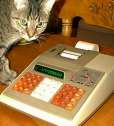Introduction
It is hard to imagine but it was a mere forty years ago, when transistor radios still had proud labels announcing "solid state" and "8 transistors", that the fledgling microchip industry was desperately in search of the "killer app" that would create a viable market for their newest invention: LSI, or Large Scale Integrated circuits, single chips containing as many as several thousand (!) transistors! Their search was not fruitless: the "killer app", indeed the first consumer electronics device that required LSI circuitry, arrived in the form of the electronic pocket calculator. Originally capable of only simple arithmetic, these machines quickly grew in sophistication, and in a few short years, although few recognized its significance at the time, the first "personal computers" were born in the form of programmable pocket calculators.
Quite possibly, it was my encounter with a Texas Instruments SR-52 calculator in 1975 or thereabouts at a Budapest repair shop that played the critical role in my later choice of computer programming for a career. I have owned a programmable calculator since I was sixteen (when I spent an entire summer's worth of student income to acquire one.) In the late 1990s, however, I began to buy vintage programmable calculators of all kinds, building a proud little collection. I also have great fun repairing vintage calculators, recelling their rechargeable batteries, reconditioning failing magnetic card readers, and fixing many electronic problems.
Little did I know when I started this hobby, that in a few short years, I'd have hundreds of programmable handheld calculators, pocket computers, and similar devices in this collection.
To view the collection, please use the navigation links on the left, or click on any of the links below. Or, proceed directly to the Exhibit Hall.
Notable Pages
 Where Can I Get a Manual, and other Frequently Asked Questions
Where Can I Get a Manual, and other Frequently Asked Questions
- A unique prototype: the TI-88
- Another rare prototype: the HP Xpander
- Yet another unique machine: the Al-Hassibah 2000
- A notable "war story": the HP-91
- The Most Primitive Programmable award goes to: the Litronix-2290
- The first Russian programmable is not a copycat machine: the B3-21
- Made in Hungary, or the story of my first programmable calculator: the PTK-1072
News
- Major (painful) upgrade (2023)
- Painful upgrade, part II (2024)
Latest News on Calculators by Google
Auto-generated from Google News Alerts
accesses to these Web pages since May 15, 2000.
NGA is an online homeschool provider for K-12 option.


